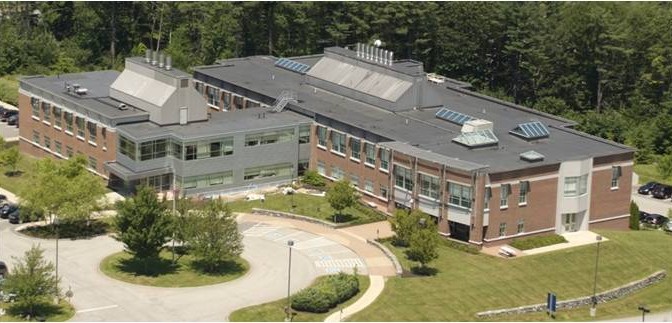Guest Post by Jessica Davis-Knowlton
About two hours north of where you sit reading your InSight there is another site of Tufts scientific discovery waiting to greet you! Tufts Sackler and Tufts University Medical School have partnerships with institutes in Maine allowing students to experience research and medicine in a unique setting with a strong emphasis on collaboration. During the 3rd and 4th rotations, first year students in Sackler have the opportunity to rotate with faculty members at the
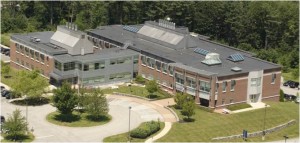
Maine Medical Center Research Institute (MMCRI) in Scarborough, Maine before joining the CMDB program or with faculty at Jackson Laboratories (Jax) in Bar Harbor, Maine before joining the Genetics program. For TUSM students in the Maine Track Program immersion in the particular challenges facing Maine physicians starts with brief stints to Maine in the first and second years followed by a 9-month Longitudinal Integrated Clerkship in the third year.
Enough background though; what is particularly exciting about Maine this November is that MMCRI will be holding their annual Open House on the 20th and all are encouraged visit! The Open
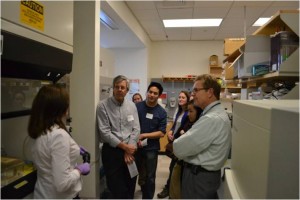
House is a great opportunity to investigate our cores (Transgenics and Gene Targeting, Histopathology and Antibody Production, Confocal Microscopy, Small Animal Imaging, Protein and Nucleic
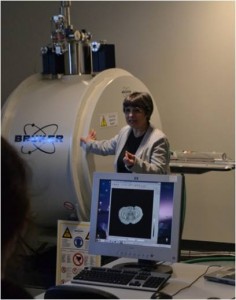
Acid Analysis, Molecular Phenotyping, Physiology and Behavior, and Clinical and Translational Research Services/Tissue Bank), see posters from Tufts and UMaine MMCRI grad students, meet the faculty, tour the building, and of course see green mice.
For first year CMDB students coming to visit on the 20th I’d like to highlight the newest principal investigator to join MMCRI and Jumbo alum, Michaela Regan, PhD. Dr. Reagan has a B.S. in Engineering from Harvey Mudd College in Claremont, California and a Ph.D. in Biomedical Engineering from Tufts University in Medford, Massachusetts. During her graduate
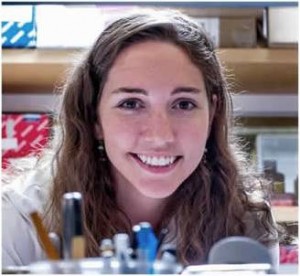
research, Dr. Regan studied Breast Cancer Bone Metastasis by investigating mesenchymal stem cell (MSC) tumor homing and developed silk scaffold implants with therapeutic bone marrow MSCs that deliver anti-tumor proteins to breast tumors. Her post-doctoral fellowship was in the lab of Dr. Irene Ghobrial at the Dana-Farber Cancer Institute/Harvard Medical School where she focused on understanding how multiple myeloma cells manipulate their bone marrow niche to support their growth and cause osteolytic lesion formation. She developed a 3D model of inhibited osteogenesis in silk scaffolds and examined the roles of abnormally expressed microRNAs in MSCs in this process. She also developed bone-targeted, bortezomib-loaded nanoparticles to modulate the bone microenvironment and make it less receptive to cancer cell colonization. When you see Dr. Regan, ask her about her path to becoming a PI: it’s all about collaboration and networking folks!
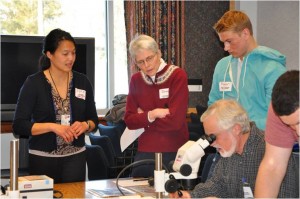
Collaboration is the name of the game up here in Maine, as research institutes scattered about the state are relatively small. As a fortuitous consequence, a culture of cooperativeness and the drive to reach far outside normal comfort zones to seek said cooperation has prevented research in Maine from becoming insular. As pressure by publishers for completeness and complexity in manuscripts mounts, partnerships between labs, and the skills to develop such partnerships, have become ever more indispensible.
Remember, Boston had more snow than Portland last year so don’t fear the “winter, still winter, almost winter, and road construction” description of seasons in Maine: come see the Maine-Tufts partnership in action!
Jessica Davis-Knowlton is a 3rd year CMDB student in the Liaw lab in MMCRI. Her thesis work focuses on the role of Notch signaling in smooth muscle cells involved in atherosclerosis.

